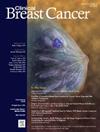Metronomic Chemotherapy in Breast Cancer as a Strategy to Deliver More Sustainable and Less Toxic Treatments: Time to Debunk the Myth?
IF 2.9
3区 医学
Q2 ONCOLOGY
引用次数: 0
Abstract
Breast cancer is the most commonly diagnosed cancer in women, worldwide. With the increasing burden of breast cancer, the search for more tolerable and sustainable treatments is required, to result in broader access to cancer treatments. Metronomic chemotherapy defines the use of chemotherapy agents based on low-dose, continuous regimens, as opposed to traditional treatments administered for limited intervals, at higher dose. The use of metronomic chemotherapies has been envisioned often as a way to reduce toxicity while maintaining similar efficacy, and result in reduced health system resource utilization, while tailoring some special populations’ needs, such as the older adults with cancer. In our review, we provide a revision of the data available on the use of metronomic chemotherapy in breast cancer, as stratified per setting of use and subtypes of diseases. Clinical trials evaluating head-to-head metronomic and nonmetronomic schedules of chemotherapies broadly failed to meet their endpoints of noninferiority and/or superiority in term of safety, showing more often similar burden of adverse effect. Efficacy was also usually comparable. Data on financial implications appeared limited, and not conclusive of economic and health system benefits with the use of metronomic schedules. Our review of the evidence suggests that broad implementation of metronomic chemotherapy to enhance sustainability and safety may be not appropriate in all settings, as data for the optimized use are still warranted. The use of metronomic chemotherapy in breast cancer as a mean to improve tolerability, reduce treatment-related complications and associate costs and enhance sustainability of cancer treatments should not be pursued as an ultimate solution, in all settings of breast cancer treatment. Standard treatments having robustly proved to improve patient outcomes are to be prioritised for first, unless data suggest otherwise with these regimens.
节拍化疗在乳腺癌中作为提供更可持续和更低毒性治疗的策略:是时候揭穿这个神话了?
乳腺癌是全世界女性中最常见的癌症。随着乳腺癌负担的增加,需要寻找更耐受和可持续的治疗方法,以使更广泛地获得癌症治疗。节律化疗定义了基于低剂量、连续治疗方案的化疗药物的使用,而不是基于有限间隔、高剂量的传统治疗。节拍化疗的使用通常被设想为在保持类似疗效的同时减少毒性的一种方法,并导致减少卫生系统资源的利用,同时适应一些特殊人群的需求,例如患有癌症的老年人。在我们的综述中,我们对乳腺癌中使用节拍化疗的现有数据进行了修订,根据使用情况和疾病亚型进行了分层。临床试验评估的头对头节律和非节律化疗方案在安全性方面普遍未能达到其非劣效性和/或优势的终点,显示出更多类似的不良反应负担。疗效通常也具有可比性。关于所涉经费问题的数据似乎有限,而且不能确定使用节拍表对经济和卫生系统的好处。我们对证据的回顾表明,为了提高可持续性和安全性而广泛实施节拍化疗可能并不适用于所有情况,因为优化使用的数据仍然是有保证的。在乳腺癌治疗的所有环境中,不应将节拍化疗作为提高耐受性、减少治疗相关并发症和相关费用以及提高癌症治疗可持续性的手段,作为最终解决方案。除非有数据表明这些方案并非如此,否则已被充分证明可改善患者预后的标准治疗应优先考虑。
本文章由计算机程序翻译,如有差异,请以英文原文为准。
求助全文
约1分钟内获得全文
求助全文
来源期刊

Clinical breast cancer
医学-肿瘤学
CiteScore
5.40
自引率
3.20%
发文量
174
审稿时长
48 days
期刊介绍:
Clinical Breast Cancer is a peer-reviewed bimonthly journal that publishes original articles describing various aspects of clinical and translational research of breast cancer. Clinical Breast Cancer is devoted to articles on detection, diagnosis, prevention, and treatment of breast cancer. The main emphasis is on recent scientific developments in all areas related to breast cancer. Specific areas of interest include clinical research reports from various therapeutic modalities, cancer genetics, drug sensitivity and resistance, novel imaging, tumor genomics, biomarkers, and chemoprevention strategies.
 求助内容:
求助内容: 应助结果提醒方式:
应助结果提醒方式:


